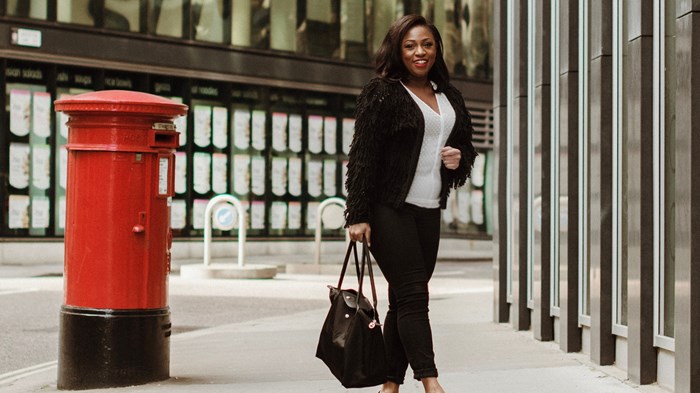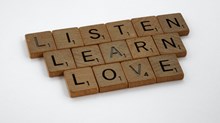You Can't Pursue Justice Unless You Truly Understand One Thing.

Genelle Aldred is a regular contributor to conversations about media, politics and justice. A former newsreader and journalist for BBC, ITN and ITV, she previously worked as Head of Digital Strategy for Tearfund and was the Channel Manager for TBN UK. Genelle now runs a communications consultancy helping people, brands and organisations with their communications, takes part of the Ethical Storytelling collective. She holds a M.A. in broadcast journalism.
Genelle’s first book about communication and social justice for UK publisher SPCK will be published later this year, and she shared with the Better Samaritan a bit of the backstory behind the message.
Why is this the right time for this book?
I think it's always the right time to have conversations around how can we have better conversations. Martin Luther King said, "For years now, I have heard the word ‘Wait!’ It rings in the ear of every Negro with piercing familiarity. This ‘Wait’ has almost always meant ‘Never.’ We must come to see, with one of our distinguished jurists, that "justice too long delayed is justice denied."
Although it's always a good time, at this moment, I think we've come to a place where we KNOW that we need to have these conversations because things are so divisive. The desire for unity then strangely manifests itself by wanting to make other people see things your way. In doing that, we become more polarised as the ante gets ramped up.
So in that sense, we are seeking unity, but in a way that I don't think works. What I would love to do is to be part of the conversation of how we seek unity in a solution-oriented way. Rather than trying to force people to see things our way, let's move ego aside and have the kind of conversations that will bring us to a more unified and peaceful way of living together on this planet.
Why is it so important to understand the biases we hold if we want to pursue justice work?
I think you can't pursue justice unless you truly understand that the way you see the world is not the way the world is.
Many people who do justice work, on all sides, believe: because I see it like this, therefore it's true, and because I feel this, it's true. And that is not the truth.
The Scripture talks about, now we see very dimly, but one day we'll see plainly (1 Corinthians 13:12: For now, we see only a reflection as in a mirror; then we shall see face to face. Now I know in part; then I shall know fully, even as I am fully known).
Sometimes we say, 'this is from my lens'—yet we don't address the issues in that way; we still try to solve them the way we see it. We probably only say it to caveat disagreement, rather than deeply understanding that is a skewed view because it's made up of my experiences, who I am and how the world sees me.
What I am observing is from my seat in the stadium of life. I need to think about the view of the stage from the other side of the stadium or in the rafters and the corners. There are at least three sides to every story: mine, yours, and truth. And so when we truly understand that—the way that I see the world is not the way the world is—it's easier to pursue justice.
We have a more well-rounded view of the problems and how we could solve them.
Seeking justice work is not about simply acknowledging you have unconscious biases. It's bringing those biases to the fore so they can be set aside and thinking about how those biases affect your behaviour and what needs to change.
Having experienced both continents, what differences do you see (if any) in the way biases emerge in American media vs. U.K. media? (Or in the way we use social media?)
I think the way biases emerge in the UK in the US is very different because we generally have different national attitudes to interacting and behaving. That is a sweeping generalisation, and it's far more complex. Still, in its absolute simplicity, I would say that people are very much more direct with their views in the US, especially political views. People say I'm Republican, and I'm a Democrat. In contrast, you can probably guess someone's politics from their spoken perspective in the UK. It's not front and centre in that same way, and I think those ways of dealing with politics are also how people speak about justice.
In the UK, we have what I would call faux politeness; it's more a fear of conflict, disagreeing, and being seen as disagreeable, which means that we often talk about things in more of a passive-aggressive way. Whereas I sometimes think in America, the aggression around these issues is at the surface.
Because of those different ways of dealing with it, even the way we use social media to talk about these issues is very different. But I don't know if either way allows us to get to the heart of the matter. If right upfront, you're like, this is who I vote for and who I am, there's no room for manoeuvre or change, and equally, if you won't name things, or speak with clarity, then there's no room for change. If we could find that midway point between being upfront, without your politics seeming to determine what you think, and not being so convoluted because we're afraid of seeming disagreeable, then we would have better conversations.
The Better Samaritan is a part of CT's
Blog Forum. Support the work of CT.
Subscribe and get one year free.
The views of the blogger do not necessarily reflect those of Christianity Today.






















